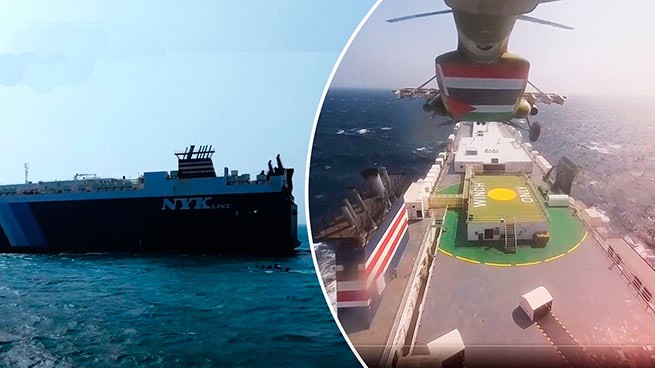The shipping situation in the Red Sea remains volatile due to attacks by Houthi rebels on commercial shipping, despite the activation of a multinational maritime defense group created under US auspices.
Shipping executives say the situation is particularly critical because the choice of 18 shipping companies, mostly container carriers, to reroute their ships around southern Africa has led to rising freight costs, increasing the final price of goods for consumers.
According to shipping brokerage Linerlytica, by December 31, 262 container ships with a total capacity of 3.4 million TEUs, or 12% of global capacity, had been diverted to the Cape of Good Hope route. Due to changes in container ship routes through the African crossing, the Freightos Baltic Index (FBX) recorded that By January 2, spot market prices for freight from Asia to Europe had risen by about 86%.
The cost of transporting a 40-foot container, which was $2,452currently reaches $4,042. In addition, prices on the route from Asia to the Mediterranean have increased by 2,774 dollar, up to 5 175 dollars per container.
The Shanghai Container Shipping Index also recorded spot prices from Shanghai to Europe rising by 80% in the week to December 29. Prices rose to $2,694 per container on the trade route, where they had been below $1,000 for almost a year. In addition, prices from China to the Mediterranean rose 70% to $3,491 per container at the end of December.
AP Moller-Maersk, following the attack on the container ship Maersk Hangzhou, announced on December 30 that it would suspend all transit from the Red Sea/Gulf of Aden until further notice. In a statement, the company said that for the safety of sailors and cargo on board, it is suspending traffic through the region and is constantly assessing the situation, redirecting ships to the Cape of Good Hope.
Following the attack, the Danish shipping company initially suspended transit traffic through the Red Sea for 48 hours, and in previous days resumed its ship routes through the Suez Canal, after setting up a US-led international maritime mission to protect shipping. It should be noted that companies that choose to navigate their vessels through the Suez Canal via the Red Sea also face a significant increase in insurance premiums for their vessels.
Despite concerns about attacks on ships, tanker traffic through the Red Sea continues and freight rates are rising on some routes. Ship brokers say ship owners want to avoid rerouting via the Cape of Good Hope as the additional costs would be about $1.1 million for the LR tanker.
The number of tankers transiting the Suez Canal remains at levels before attacks on ships in the area spiked in December, according to Clarksons Research. Almost 15% of global maritime trade passes through the Red Sea, including 8% of global grain trade, 12% of global seaborne oil trade and 8% of global LNG trade.
In a joint statement, 12 states called for an immediate end attacks The Houthis warned of responsibility for the consequences if they continue to threaten human lives, the global economy and free trade on the region’s critical waterways. “We remain committed to the rules-based international order and are determined to hold perpetrators accountable for unlawful seizures and attacks,” the statement said.
Interested countries include the US, Australia, Bahrain, Belgium, Canada, Denmark, Germany, Italy, Japan, the Netherlands, New Zealand and the UK. The World Maritime Council, the International Chamber of Shipping and BIMCO, in a joint statement, expressed gratitude to the 12 nations who jointly condemned the ongoing unlawful attacks on ships.
IMO Secretary-General Arsenio Domínguez condemned attacks on merchant ships in the Red Sea, saying the IMO continues to monitor the situation closely and is working with the entire shipping industry on the issue. He reaffirmed the International Organization’s strong commitment to the protection of seafarers, ships and cargo, which he said was “of paramount importance to ensuring the safety and security of global supply chains.”







More Stories
Greece: growth in deposits from households and businesses in March 2024
EU employment record: Greece "stuck" in a low position
“Bonus” of 300 euros for the long-term unemployed